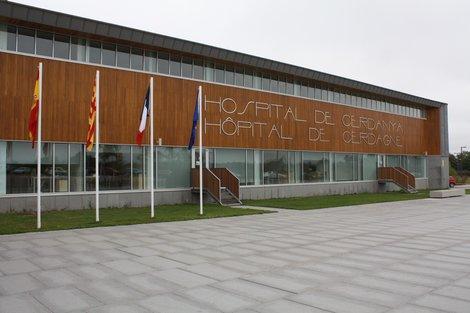Cerdagne cross-border hospital (France-Spain-Andorra)
2014
Cross-border cooperation is a partnership between private or public players separated by a State border, whose actions have repercussions at regional and local level on either side of the border. Within the European area, 360° mobility across the border, the projects and policies that accompany this mobility in territories close to the border, the progressive cross-border integration that this cooperation builds and which gives rise to cross-border territories, characterise different experiences. To illustrate the results of more than 20 years of cooperation within the Mission Opérationnelle Transfrontalière (MOT), 20 unique experiments conducted by MOT members for the benefit of the inhabitants of cross-border territories have been highlighted in various fields: here we look at health with the example of the Cerdagne cross-border hospital (France-Spain).
Cross-border health cooperation brings together health professionals from two or more countries close to their borders. It is of great benefit to citizens, by filling a medical desert or making the most of the complementary nature of the specialities and facilities on either side of the border. The essentially national nature of healthcare systems, due to limited European competence, and the administrative red tape that characterises care received abroad, remain obstacles to its implementation.

The Cerdagne (Catalan and French) cross-border hospital opened its doors in autumn 2014. It represents a pioneering project in Europe. For the first time, a hospital will be managed on a cross-border basis from the moment it is built. It is located in Puigcerdà on the Spanish side, two kilometres from the border.
The aim is to make up for the lack of hospital facilities in an isolated mountain region where the population can rise from 30,000 out of season to 150,000 during the tourist season. In particular, it aims to provide emergency and obstetric care that could only be provided in Perpignan, more than 100 km away (at least 1? hours by road). 68 beds are available for acute short-stay patients and will be accessible to French patients. The hospital will also provide the cross-border area with major health facilities such as an MRI and scanner. The hospital is being built in the « Plana de Rigolisa » area, on a 17,000 m² plot made available by Puigcerdà town council. It is governed by the Cerdanya Hospital EGTC.
In both its construction and management, the facility is intended to be truly cross-border; it is based on a single culture incorporating the advantages of the French and Spanish systems. A division of sectors enables the structure to benefit from best practice on both sides. For example, radio services are provided by the Perpignan hospital in the form of a service provision agreement, while geriatric and rehabilitation services are managed by the « Pôle sanitaire cerdan », a branch built on the French side. This centre, managed by a Groupement de Coopération Sanitaire (GCS) of which the EGTC is a member, also provides logistical services for the hospital, such as cleaning, meals and green spaces. It encounters a number of obstacles in its day-to-day operations (employment, health insurance, etc.), which are gradually being resolved. Particularly complex issues linked to the presence of the border have had to be dealt with, such as births (and civil registration) and the repatriation of bodies to the other side in the event of death.
Emblematic of cross-border cooperation, the cross-border hospital was awarded the BUILDING EUROPE ACROSS BORDERS prize by the European Committee of the Regions.
Aims of the project
The aim of this project is to provide the French and Catalan Cerdagne with a medical facility capable of meeting the needs of an isolated mountain region. In both its construction and management, the facility is intended to be truly cross-border. It is based on a single culture integrating the advantages of both systems, with three fundamental principles:
-
The hospital is fully cross-border, with French and Spanish staff (eventually 200 people).
-
French patients are treated in this hospital under the same conditions as in France.
-
The Cerdagne health centres receive Spanish patients on a reciprocal basis for the pathologies they treat and for immediate care.
Partners
European Union (European Regional Development Fund)
France :
-
French Ministry of Social Affairs and Health
-
Regional Health Agency
-
Pyrenees Working Community
-
Languedoc-Roussillon Regional Council
Spain: Spanish Ministry of Health and Social Policy
-
Spanish Ministry of Health and Social Policy
-
Generalitat de Catalunya - Departament de Salut
-
CatSalut - Servei Català de la Salut
Duration of the project
Construction: 2003-2013; creation of the EGTC: 2010; opening of the hospital: September 2014
Total cost
31 000 000 €
European subsidies
18 600 000 €